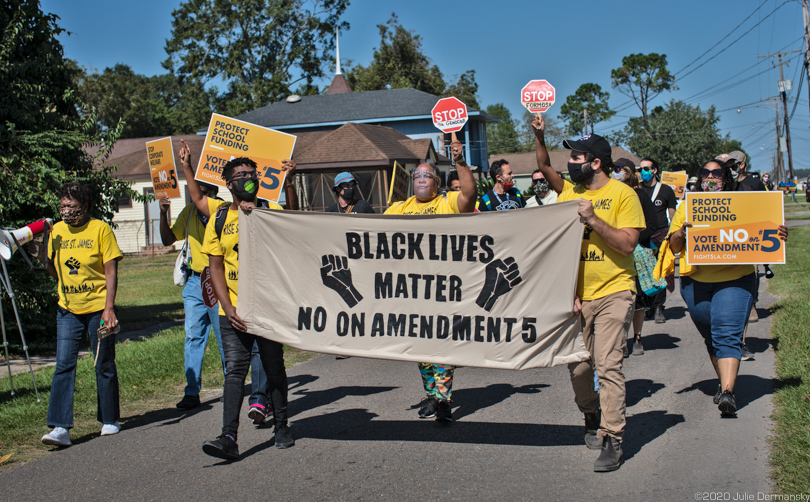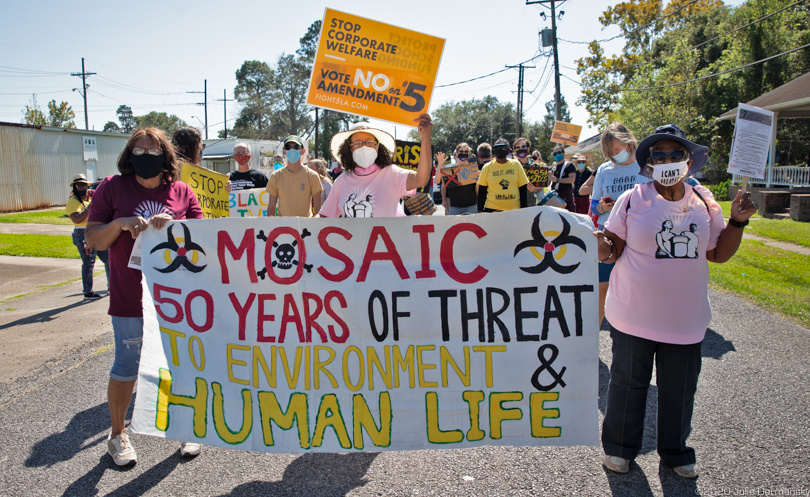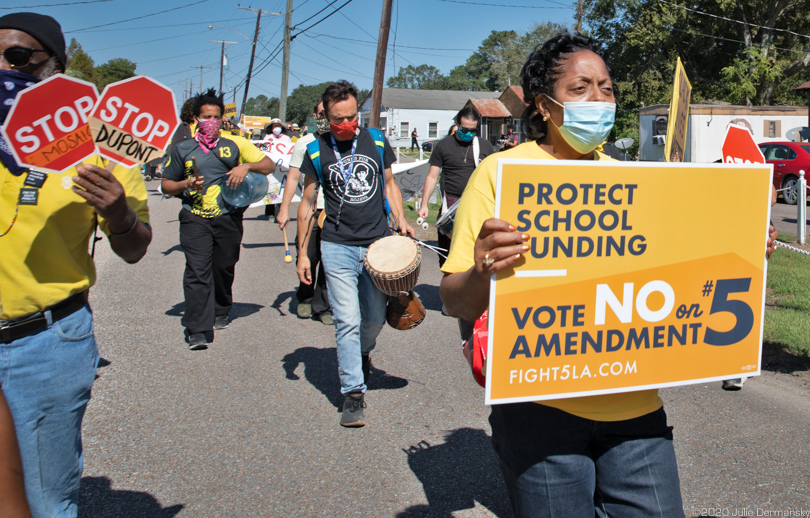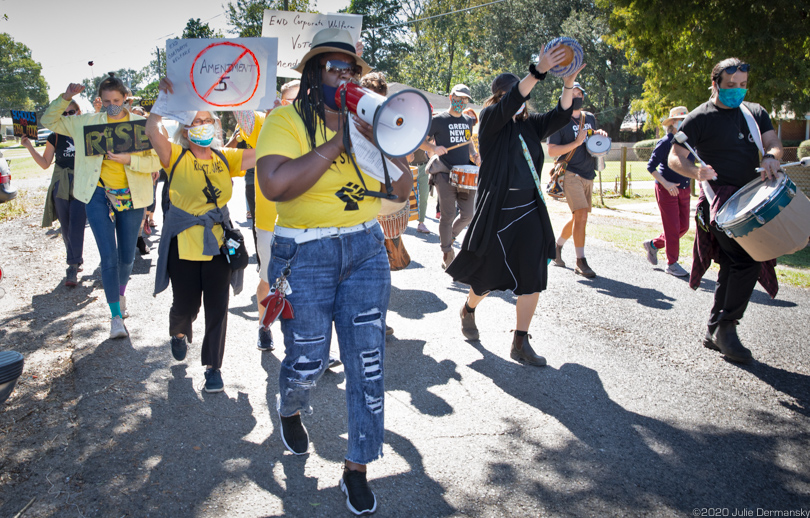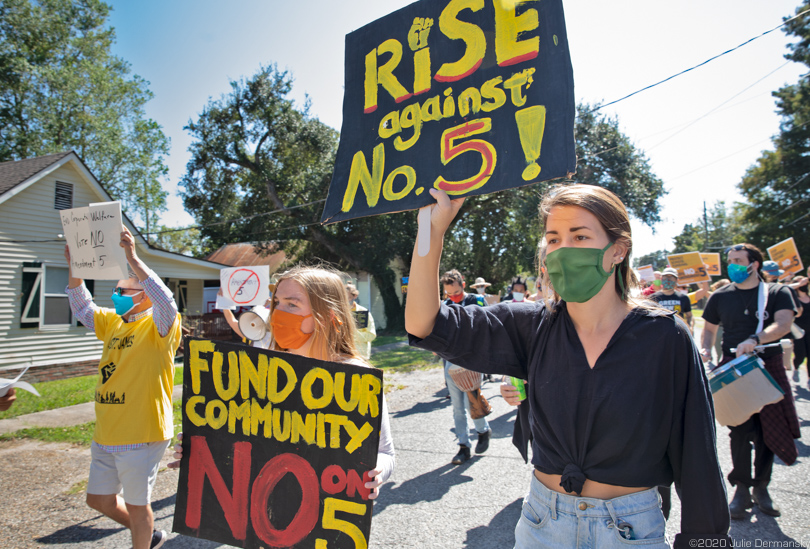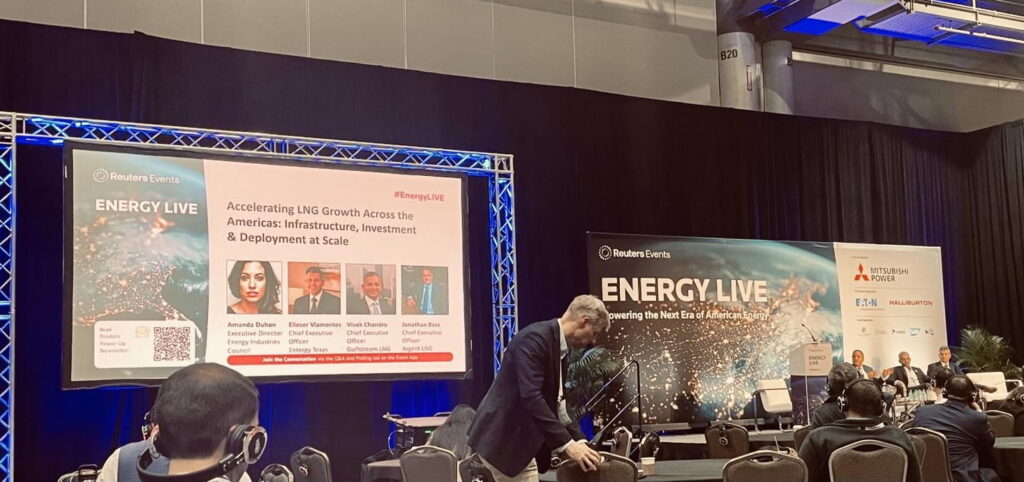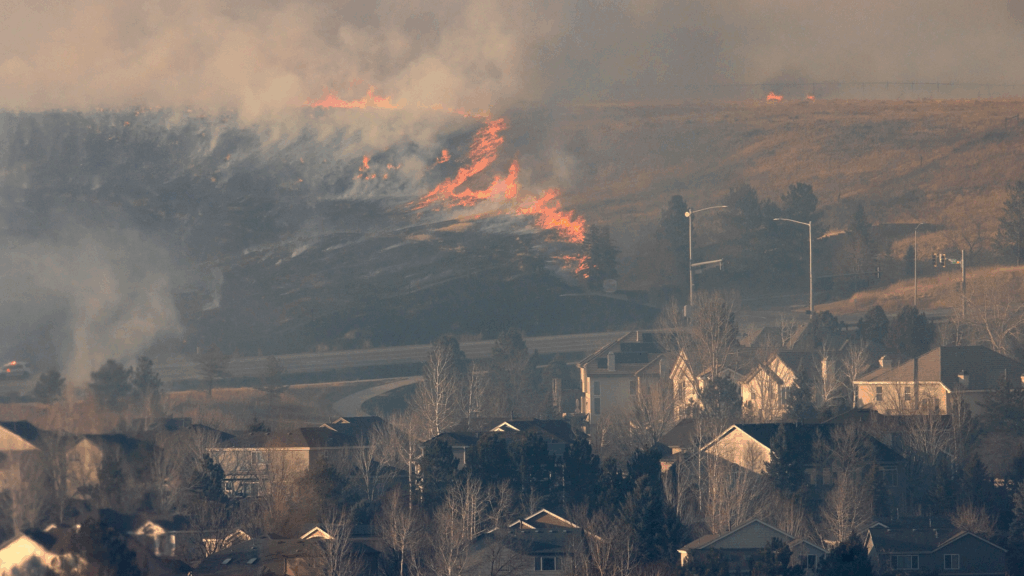Environmental and community groups in Louisiana are elated after what they see as two back-to-back wins in their fight to protect fenceline communities from additional petrochemical industry pollution. This week, a key federal permit for a $9.4 billion petrochemical complex under construction in St. James Parish, near largely Black and poor communities, is on pause, and Louisiana voters rejected an amendment that could have let petrochemical companies off the hook for paying property taxes in the state forever.
The U.S. Army Corps of Engineers announced on November 4 that the agency plans to reevaluate its wetlands permit for Formosa Plastics’ sprawling plastics manufacturing complex, known as the Sunshine Project, along a heavily industrialized stretch of the Mississippi River known by some as Cancer Alley. During the permit review, the Corps said it will address criticisms raised by environmental and community groups in a lawsuit filed in January this year.
The Corps asked a judge to halt the lawsuit while it reevaluates the permit, which it could suspend, modify, or revoke after further review. The Advocate reported that the Corps will release a more detailed explanation of its rationale for the pending review by November 10.
This move came just a day before a court deadline for the Corps in the lawsuit.
If ultimately approved, the plastics facility, one of several slated for the Gulf Coast, will be a massive complex, with 14 units producing two types of plastic and the petrochemical ethylene glycol, which is used to make polyester fabrics and antifreeze.
On January 15, 2020, the Center for Biological Diversity, RISE St. James, Louisiana Bucket Brigade, and Healthy Gulf sued the Corps over the wetlands permit, alleging that the Army Corps of Engineers neglected to disclose the environmental damage and public health risks of the plastics facility under the National Environmental Policy Act. In addition, the suit alleges that the Corps failed to adequately consider the harm to cultural resources such as slave burial grounds on the site, which is a violation of the National Historic Preservation Act.
Residents of Cancer Alley marching with supporters in Lutcher, Louisiana, on October 17, 2020.
The groups also alleged that the Formosa project will destroy wetlands that guard against flooding; will further pollute the Mississippi River, which provides drinking water for New Orleans; and will more than double air pollution in an area that the U.S. Environmental Protection Agency (EPA) already has cited for elevated levels of air pollution.
When asked if the Army Corps of Engineers had ever revoked a wetlands permit, Ricky Boyett, Corps spokesperson in New Orleans, declined to answer. “I have [been] directed to not comment regarding the details regarding the litigation or anything related to the litigation,” Boyett wrote by email, directing me to the Department of Justice.
Anne Rolfes is founder of the environmental nonprofit the Louisiana Bucket Brigade, and has been fighting for environmental justice for fenceline communities in Louisiana for 20 years. She said that she has never seen the Corps take such an action as it did this week.
“If it were a small fix, they would’ve just made a side deal with Formosa and told them to fix it. But it was time for the Army Corps to defend this permit in court and they obviously didn’t feel that they could do it,” Rolfes said. “I think it shows that what we’ve been saying all along is right: that the permits are fatally flawed and indefensible.”
FG LA, a subsidiary of the Taiwan-based giant Formosa Plastics Group, did not oppose a court-ordered halt in the litigation. “The permit has not been suspended. As indicated in its motion, the Corps has not yet taken further regulatory action and anticipates providing additional guidance by November 10,” Janile Parks, FG LA’s spokesperson told DeSmog. “If the Corps takes further action on the permit itself, FG will comply with its duties as required by that action.”
Read more in the series Louisiana’s Cancer Alley Communities at Risk
In July, the company had already agreed to limit its construction activities until early next year as part of a legal agreement that stipulates major construction will not move forward until February 2021. And before the Corps announcement, the Advocate reported that FG LA planned to defer major construction until the pandemic subsides or a COVID-19 vaccine is widely available.
The first agreement to delay major construction came at a time when petrochemical megaprojects nationwide are under increasing scrutiny from investors and financial analysts. “Converting ethane to ethylene is still profitable, says Alan Gelder of Wood Mackenzie, an energy-research firm, ‘just not as profitable as some hoped,’” the Economist reported in June. In July, South Korean chemical giant Daelim announced that it was withdrawing from PTT Global Chemical’s proposed petrochemical complex on the Ohio River in Appalachia, and PTT has repeatedly delayed a final investment decision for the project.
The Louisiana Bucket Brigade sees Formosa’s willingness to delay major construction as a sign of the company “wobbling.” In an October 21 press release, the group said, “The company still hasn’t made its final investment decision, and its other U.S. plants aren’t faring well. This summer, Formosa’s facility in Point Comfort, Texas, was not able to fulfill its contracts because it couldn’t make production quotas. All across the world, countries are banning single-use plastics, and new projects — like the one proposed in St. James Parish — are meeting massive resistance.”
Sharon Lavigne protesting against Amendment 5 in Lutcher, Louisiana, on October 17, 2020.
“I told everyone we would stop Formosa and we are,” Sharon Lavigne, founder of RISE St. James, a community organization fighting to stop more petrochemical plants from being built in her neighborhood, said after she learned about the Corps’ action. “The Sunshine Project won’t ever see any sunshine.”
Stephanie Cooper, vice president of RISE St. James, leading a chant during a protest march on October 17, 2020.
RISE St. James Black Lives Matter March in Lutcher, Louisiana, on October 17, 2020.
RISE St. James organized a protest march on October 17 to raise awareness against Amendment 5, which appeared on Louisiana’s November 3 ballot. A few dozen people marched, some holding signs, others playing drums, while chanting, “Say no to Amendment 5.” They handed out information on the amendment to community members in Lutcher, a town in St. James Parish.
If passed, the measure would have allowed manufacturers to negotiate lower tax bills with local governments, giving the petrochemical industry a way to permanently avoid paying property taxes. “Stopping Amendment 5 from passing shows when we say, ‘no,’ we mean, ‘no,’” Lavigne said.
Main image: RISE St. James Black Lives Matter March in Lutcher, Louisiana, on October 17, 2020. Credit: All photos by Julie Dermansky for DeSmog
Subscribe to our newsletter
Stay up to date with DeSmog news and alerts


